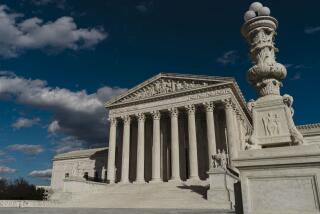Ugly secrets
- Share via
The U.S. 9th Circuit Court of Appeals took a courageous stand this week when it ruled that five alleged victims of the government’s “extraordinary rendition” program -- each of whom says he was kidnapped and tortured at the behest of the U.S. government -- were entitled to their day in court.
That may not sound like an extraordinary victory, but it is. The three-judge panel that made the ruling in Mohamed vs. Jeppesen Dataplan Inc. did so over the strenuous objections of the Bush and Obama administrations, both of which called for the case to be tossed out under what’s known as the “state secrets privilege.”
A Justice Department lawyer, for instance, argued in February that such vital secrets were at stake in the case that going forward would be “playing with fire.” And former CIA Director Michael V. Hayden’s warning was even more ominous: Information would be disclosed that could help America’s enemies and cause “exceptionally grave” danger to U.S. national security.
To their credit, the judges did not roll over. They noted that the government’s powers to protect secret information were “not the only weighty constitutional values at stake.” They concluded, among other things, that it is possible to protect secrets on a document-by-document basis without dismissing entire cases.
We agree. In theory, the state secrets privilege makes sense. But the Bush administration became addicted to it and asserted it dozens of times -- far more than any previous administration. After 9/11, courts were overwhelmingly accommodating; not once were officials required to turn over material they claimed was secret.
That’s how Khaled El-Masri, allegedly tortured by the CIA in Afghanistan in a case of mistaken identity, had his lawsuit thrown out. So did Maher Arar, a Canadian seized in New York and sent to Syria, where he says he was tortured regularly for almost a year.
As a candidate, Barack Obama criticized the overuse of the state secrets privilege. But when the Mohamed case came before the 9th Circuit in February, his Justice Department lawyers argued (as their predecessors had) that it should be dismissed. That was a mistake. Although we do not believe in giving away vital secrets or aiding terrorists, we do think the privilege should be used sparingly and in a limited manner. The government has too often used it not to protect legitimate secrets but to cover up activities that might prove embarrassing.
The extraordinary rendition program, which is by now notorious around the world, falls more easily into the embarrassment category.
More to Read
Sign up for Essential California
The most important California stories and recommendations in your inbox every morning.
You may occasionally receive promotional content from the Los Angeles Times.









